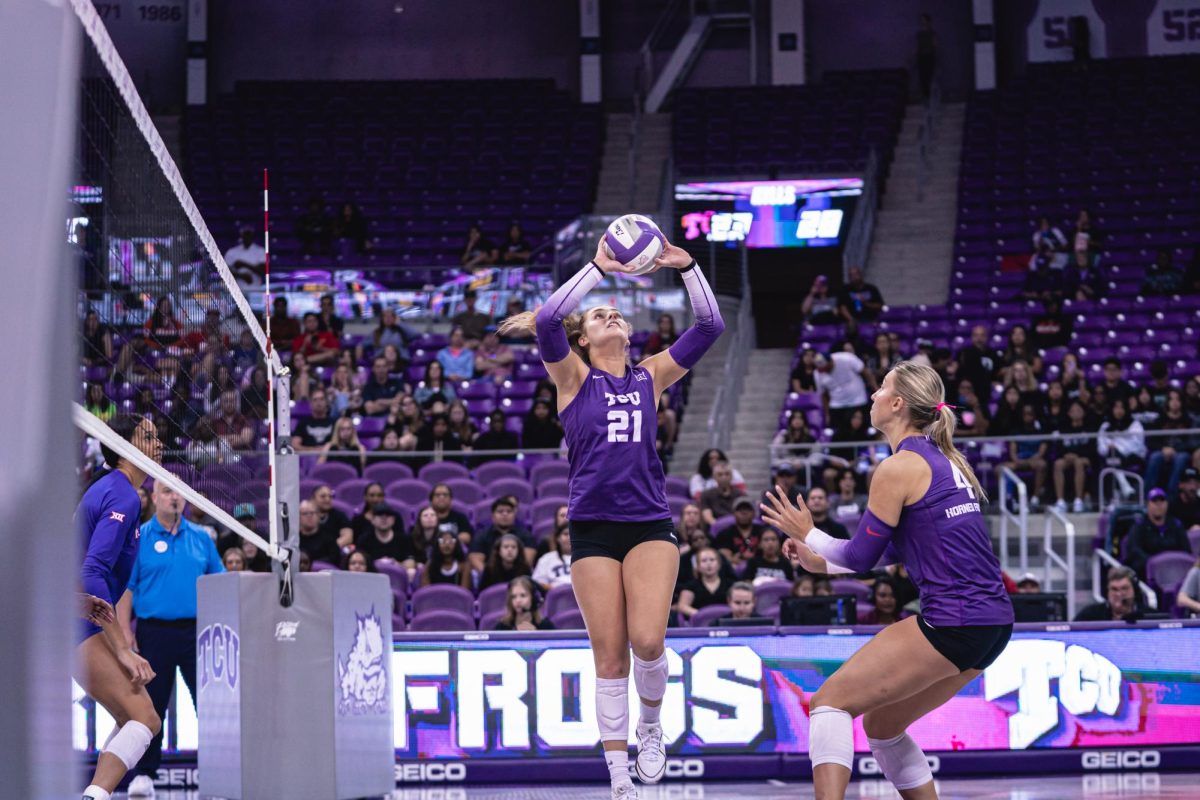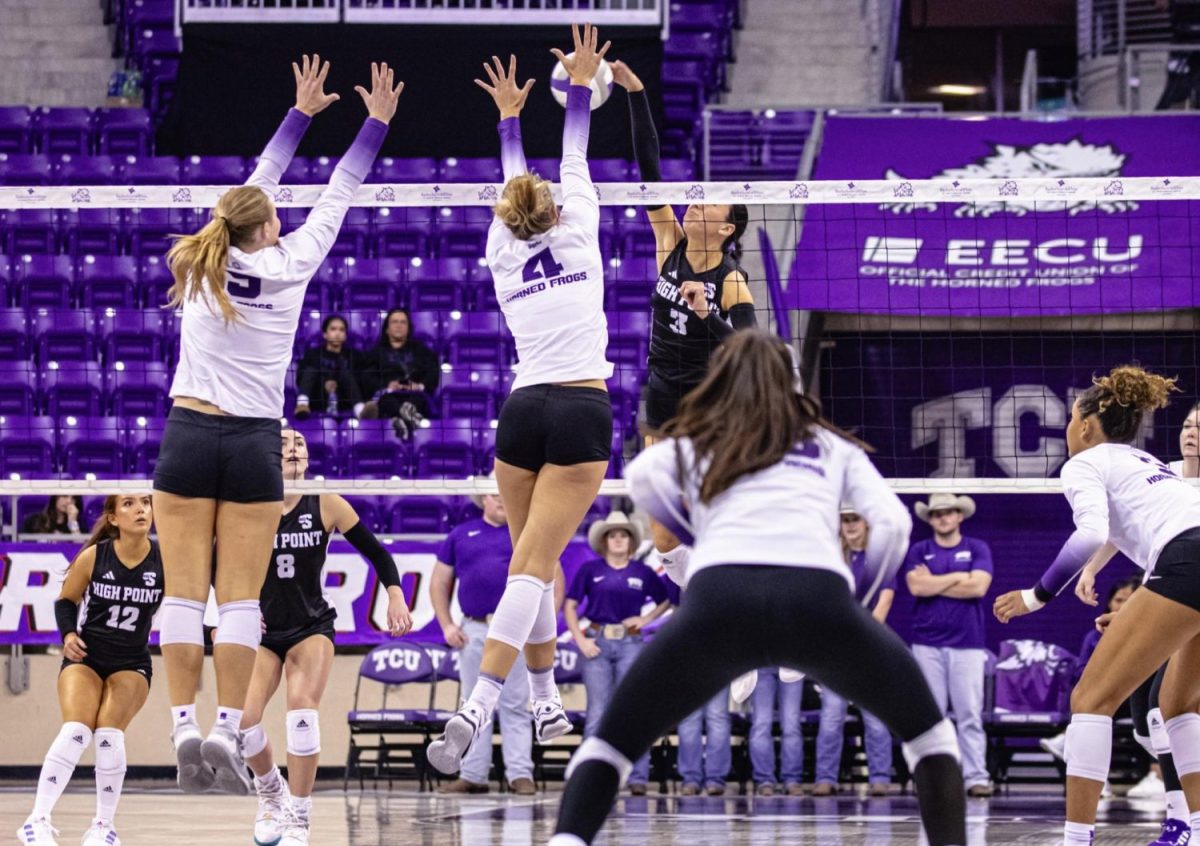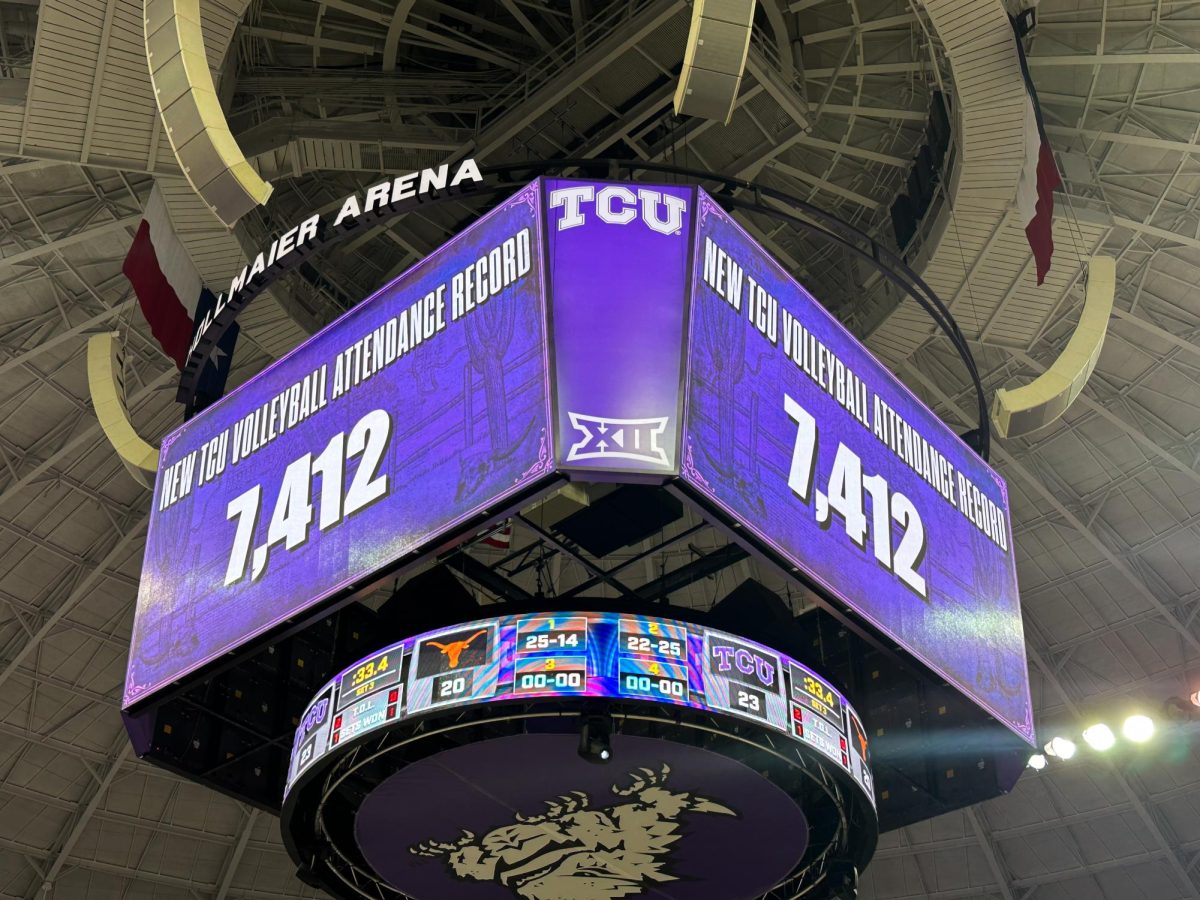Erik Peterson was hired by TCU in January to become the university’s first-ever sand volleyball coach after serving as an assistant for Oklahoma’s indoor volleyball team for three years.
The inaugural head coach doesn’t seem like he’s had any trouble adjusting to his new home in Fort Worth – he’s been frequently moving around since his childhood.
Growing up, Peterson was an army brat, or as he put it, one of the army brats who was lucky enough to grow up mostly in Hawaii.
His family moved to Hawaii, where his dad was stationed, when Peterson was six months old.
When Peterson was in middle school, he and his friends would make their way to the beach to play volleyball. In seventh grade, he began playing competitively.
Peterson said he and his buddies were close with their coach. He said that if they would take the nets to the beach and set them up, they were allowed to play in tournaments for free.
“I started playing sand before I was playing indoor,” Peterson said. “They didn’t really have league and teams and stuff like that, so a lot of it was just kind of like pick up.”
Peterson played volleyball, both indoor and sand, every year since the seventh grade. Although, he did ditch volleyball for football during his freshman year of high school, which he said didn’t work out too well.
During his sophomore year, his dad got stationed in Atlanta, where he played club indoor volleyball and would travel to tournaments across the country.
The years Peterson spent traveling state-to-state to play in indoor volleyball tournaments earned him a scholarship at Concordia College in Bronxville, New York.
He said even though he mostly played sand volleyball, the men’s indoor route was the best way for him to get a scholarship.
Peterson didn’t have much difficulty adjusting.
He was named Concordia College’s freshman athlete of the year and finished his collegiate career with 1,103 digs, an NCAA record.
But upon moving to New York, Peterson found himself playing in sand volleyball tournaments all across the east cost, where he eventually became a coach and trainer in the USA High Performance leagues. It was also where he met Jill Kramer, who is now TCU’s director of volleyball operations and the head coach of the indoor team.
“From the moment I began looking at the director of volleyball position at TCU, I knew Erik was the right fit to become the first sand volleyball coach in the history of our program,” Kramer said after she hired Peterson back in January.
“Erik is a well-trusted colleague and friend. He is very well versed in sand volleyball as a coach and player, with strong ties in Hawaii, Florida and California, as well as being very familiar with recruiting in the North Texas region and the Big 12 Conference.”
Peterson said he has enjoyed working with Kramer in the few months they’ve been colleagues at TCU.
“It’s awesome,” he said. “We’re basically like a tight-knit happy family.”
Having a familiar colleague to work with isn’t the only aspect of working at TCU that Peterson said he’s enjoyed. He said TCU’s reputation on the west coast has helped him in recruiting.
“TCU has a very strong academic reputation,” he said. “That’s one of the reasons why California kids will leave the state – to go somewhere with that diploma, it just holds so much value.”
Last Wednesday, Peterson signed ten recruits for next season, most of them walk-ons.
The head coach said the reason why there are so many walk-ons in the class is because volleyball, like baseball and soccer at TCU, is an equivalency sport. Meaning, the teams are given a pool of money, rather than scholarships, to divide amongst their players to go towards their tuition.
Sand volleyball will receive less money than TCU’s other equivalency sports because it’s a new program, said Peterson.
“It’s not necessarily a bad thing,” Peterson said in regards to his team receiving less money. “It is what is, and everybody has had to jump through those hoops and it’s our turn.”
The biggest challenge Peterson said he had to face this season as an inaugural head coach was helping the indoor volleyball players make the transition to the sand game.
He said the sand game is very different from the indoor game. The movement is more challenging, and the jumping and timing is very different in sand volleyball, thus, he said his team often became frustrated when they struggled with the changes.
“I think the biggest challenge was helping them overcome frustration,” he said. “They competed [indoor], they won big matches, and all of the sudden they’re out there [in the sand] and they’re not as competitive as they wanted themselves to be.”
“They are holding themselves to a really high bar, a really high standard. I’m just getting them to buy into the process and understand that it’s just not about today’s results, today’s results are building towards tomorrow’s.”
Peterson said the ways the two styles of volleyball are coached are also very different. He said there is much less instruction from coaches in sand volleyball than there is in indoor volleyball.
“It was kind of like a breath of fresh air,” he said. “It was different for a lot of them because some them play for super competitive club systems, and they’re used to that constant instruction.”
TCU’s indoor players played in 11 matches in the sand this year.
The Frogs didn’t win a single one. In fact, they only won one set all season.
Peterson said he knew his team was frustrated with the way their season was going, but he saw improvement during their match with then ranked No. 1 USC.
“Against USC was the best we played,” he said. “Just the feeling that they had after we finished competing in that match, that I think was a huge turning point for the team.”
All 11 matches the Frogs played in this year were on the road. That will change next year as TCU is renovating its outdoor sand courts to be more suitable for NCAA competition.
Perhaps having a home schedule will be good for Peterson’s life at his own home that sits near Fort Worth’s Trinity Trail. He wouldn’t have to do as much traveling next season, and he could get to be re-united with his best friend, a 60 pound boxer-mix named Kai, who is living at his parent’s house in Florida.
But even without Kai, the new head coach seems to be enjoying Fort Worth.
Peterson said he enjoys checking out the Stockyards and Sundance Square. He said he also likes to paddle board down the Trinity when he has the chance.
But he said one of the coolest things about living in Fort Worth is working for TCU.
“You can see how engaging the TCU fan base is,” he said. “And it’s kind of cool working for an athletic department that has that sort of backing and that sort of fan support. It’s really cool to see across Fort Worth how much excitement there is about TCU athletics and TCU as a university.”





